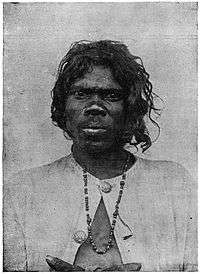Soliga people
|
A Sholaga man (1909). | |
| Total population | |
|---|---|
| 20,000 | |
| Regions with significant populations | |
|
| |
| Languages | |
| Sholaga language | |
| Related ethnic groups | |
| Irula, Tamil, Yerukala |
Soliga, also spelled Sholaga and Shōlaga, is an ethnic group of India. Its members inhabit the Biligirirangan Hills and associated ranges in southern Karnataka, mostly in the Chamarajanagar and Erode districts of Tamil Nadu. Many are also concentrated in and around the BR Hills in Yelandur and Kollegal Taluks of Chamarajanagar District, Karnataka. The Soliga speak Sholaga, which belongs to the Dravidian family. A scheduled tribe, they have a population of around 20,000 individuals.
Origin
The Soliga tribe trace their origin to Karayya, son of Lord Maleya Mahadeshwara, swamy of Maleya Mahadeshwara Hills, Karnataka.[1] Legend says that on seeing Karayya's affinity towards wild animals, Lord Maleya Mahadeshwara swamy asked Karayya to reside in forests, whereas other fusiom son Biliyayya resided in plains and became the forefather of Lingayats.[1]
Language
The Soliga speak the Sholaga language (Soliganudi) as a mother tongue. A member of the Dravidian family, it is most closely related to Kannada with several Tamil influences.[2]
Groups
There are five sub groups of Soligas:[1]
- Male Soliga: Kannada speakers residing in Karnataka
- Urali Soliga: Kannada and Tamil speakers, residing in border areas of Tamil Nadu
- Pujari group: reside in Maleya Mahadeshwara Hills
- Kadu Soliga: reside near Bandipur Forest
- Burude Soliga: reside in Heggadadevanakote Taluk and Kodagu
Furthermore, these groups have several sub-groups.[1]
Occupation and social status
The Soliga used to practice shifting cultivation, but have more or less given up this practice now. They grow Ragi (Finger millet, Eleusine coracana) for subsistence. Their main source of income is harvesting and sale of Non-timber Forest Produce (NTFP) like honey, nellikai (gooseberry, Emblica officinalis), bamboo, Paasi (Lichen). They also make baskets using bamboo.[1] They are increasingly being brought to the "mainstream" with active Government and NGO initiative. Many have been given lands closer to 'civilised areas' and most of the forest-dwelling population have been brought together into clusters called Podus. Most of the forest area they stay comes under wild life protection area. The Biligirirangan Hills are Wildlife Sanctuary under Wildlife Protection Act, 1973, the Malai Mahadeswara Hills is a Reserve Forest, and Bandipur is a National Park. Their rights on harvesting NTFP is being sought to be withdrawn citing conservation concerns, sparking a debate about the rights of indigenous people.
Religion
Soliga people follow Hindu practices and their main deities are Madeshwara, Rangaswamy of Biligirirangana Hills (who is considered the brother-in-law of the clan), Karayya, Kyate Devaru and Jadeswamy.[1] Other deities worshipped by them include Madeshwara, Basaveshwara and Nanjundeshwara and Sri Alamelu Ranganayaki smetha Sri ranganatha.[1]
See also
References
- 1 2 3 4 5 6 7 Singh, Nagendra Kr. Global Encyclopaedia of the South Indian Dalit's Ethnography, Volume 1 (2006 ed.). New Delhi: Global Vision Publication House. pp. 759–763. ISBN 9788182201682. Retrieved 6 September 2012.
- ↑ Buchanan, Francis (1870). A Journey from Madras Through the Countries of Mysore, Canara, and Malabar. Higginbotham and Co. ISBN 1108116302.
External links
- Indian tribe secures unprecedented rights to tiger reserve Survival International
- The Soligas of Karnataka and their intimate relationship with nature on Biodiversity of India wiki
